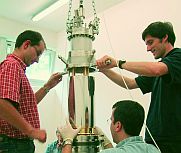Know-how-Transfer from the Empa
New Master’s Degree in Micro- und Nanotechnology
A new science has emerged as a consequence of the increasing trend for researchers in biology, chemistry, physics and material sciences to break out of the confines of their own disciplines. When dealing with fundamentals, the new field is called «Nanoscience»; when focused on applications the name is «Micro and Nano Technology» or MNT.

|
In order to be able to implement the results of micro and nano science research without delay, the Empa is actively participating in an influential, interdisciplinary network dedicated to knowledge transfer. In cooperation with higher educational authorities and private enterprises, the initial efforts are bearing fruit – the first product to emerge from the Micro and Nanotechnology Network of the Euregio Bodensee is a part time course of study leading to a master’s degree, beginning in the autumn of this year. The new further education course is the first of its kind anywhere, as reported at the first of four information evenings held at the Empa Academy on March 2nd 2004. It is intended for engineers who wish to apply the know how they have accumulated in the field of micro and nano technology to the further development of their products.
Why is the EMPA involved? The EMPA is of the strong conviction that it has much to offer to the students of the new MNT Master’s course in the way of experience in material science and technology. Its reputation as a “center of excellence” in micro and nano technology within the domain of Federal Institutes of Technology (ETHs) is well established. Particularly noteworthy in this respect are the efforts of the research teams in the nanotech@surfaces, Electronics/Metrology and Functional Fibers and Textiles Laboratories. Other educational institutes participating in the master’s course are the University of Applied Science, Vorarlberg, (FHV), the Interstate University of Applied Sciences of Technology Buchs (NTB), and the Zurich University of Applied Sciences, Winterthur (ZHW). Each of these institutions is responsible for one of the four modules, of which the course comprises. Scientific standards will be guaranteed by the ETH Zurich.
Quality appraisal «very good» Rigorous appraisal of the course and lecturing staff by renowned experts from the University of Basel and the Institute for New Materials in Saarbrücken, resulted in a verdict of “very good”. The University of Applied Science, Vorarlberg, (FHV) in Dornbirn is subject to EU regulations that recognize master’s degree courses of this kind. The program of study involving lectures and practical work is therefore undertaken primarily in Dornbirn, but also in part at the other three institutions. In autumn 2004 the first twenty students drawn from all the countries abutting Lake Constance will begin the four-semester course. One further semester will be necessary to complete their master’s theses. After passing the final examinations in spring 2007, the students will receive their degrees and be awarded the title of Master of Science (Micro and Nanotechnologies).
Further information evenings will take place as follows: University of Applied Science, Vorarlberg, (FHV), Dornbirn: Tuesday, 6th April 2004, 7 pm. www.fh-vorarlberg.ac.at Zurich University of Applied Sciences, (ZHW), Winterthur: Wednesday, 28th April 2004, 7 pm. www.zhwin.ch Interstate University of Applied Sciences of Technology (NTB),
Buchs: 6th May 2004, 6 pm. www.ntb.ch
For further information please contact: Paul W. Gilgen, Knowledge Management and Technology
Transfer Dr. Pierangelo Gröning, Head of nanotech@surfaces
Laboratory. |
||
|
||||
